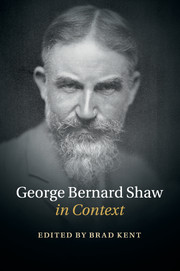Book contents
- Frontmatter
- Dedication
- Contents
- List of illustrations
- Notes on contributors
- Preface
- Acknowledgements
- A Chronology of Shaw's Works
- List of abbreviations
- PART I PEOPLE AND PLACES
- PART II THEATRE
- PART III WRITING AND THE ARTS
- PART IV POLITICS
- 24 Censorship
- 25 Empire and nationalism
- 26 Feminism
- 27 Irish politics
- 28 Socialism
- 29 Totalitarianism
- 30 War
- PART V CULTURE AND SOCIETY
- PART VI RECEPTION AND AFTERLIFE
- Further reading
- Index
- References
29 - Totalitarianism
from PART IV - POLITICS
Published online by Cambridge University Press: 05 October 2015
- Frontmatter
- Dedication
- Contents
- List of illustrations
- Notes on contributors
- Preface
- Acknowledgements
- A Chronology of Shaw's Works
- List of abbreviations
- PART I PEOPLE AND PLACES
- PART II THEATRE
- PART III WRITING AND THE ARTS
- PART IV POLITICS
- 24 Censorship
- 25 Empire and nationalism
- 26 Feminism
- 27 Irish politics
- 28 Socialism
- 29 Totalitarianism
- 30 War
- PART V CULTURE AND SOCIETY
- PART VI RECEPTION AND AFTERLIFE
- Further reading
- Index
- References
Summary
From the moment Shaw first heard the American economist Henry George lecture on the need for Land Nationalisation in 1882, he regarded himself as committed to the cause of political and economic reform. It was not long after this that Shaw first read Karl Marx, which had an even greater impact on him. Despite serious disagreements with various aspects of Marx's economics, most especially his theory of surplus value, Marx remained a profound influence on Shaw throughout his life. In late 1884, Shaw joined the newly formed socialist organisation, the Fabian Society, and remained on the executive committee for almost thirty years. But despite his commitment to the Fabians, Fabian gradualism was antithetical to his nature, and as early as 1889 he would write of his impatience with this ‘sordid, slow, reluctant, cowardly path to justice’. Shaw's authorised biographer Hesketh Pearson concurs with this view, remarking that Shaw's Fabianism was ‘no more native to him than to William Morris, who could not breathe in it’. So it should not be surprising that Shaw was fully in support of Lenin and the Bolsheviks, but was especially admiring of Stalin, whose Five-Year Plans Shaw believed were consonant with Fabian theory.
Stalin's First Five-Year Plan was implemented in 1929, and in 1931 Shaw visited the Soviet Union. After his return he began writing The Rationalization of Russia, and although he never finished or published the essay he managed to scatter much of its content in the various prefaces that he wrote in the thirties, including those to On the Rocks and The Simpleton of the Unexpected Isles, which advocate the extermination of incorrigibly anti-social citizens. But the most fascinating dramatic presentation of Shaw's enthusiasm for the Russian experiment is found in the latter play itself, which he composed in 1934. Like his earlier play Back to Methuselah and his later play Farfetched Fables, The Simpleton is a species of the utopian genre, set on a remote island that is supposed to have come ‘up out of the sea’ (CPP VI: 785). The island is utopian in that eugenic experiments are carried out freely, its moral code is antithetical to that found in the British Isles, and in the latter part of the play an angel descends from the skies to exterminate parasites and idlers.
- Type
- Chapter
- Information
- George Bernard Shaw in Context , pp. 238 - 245Publisher: Cambridge University PressPrint publication year: 2015



